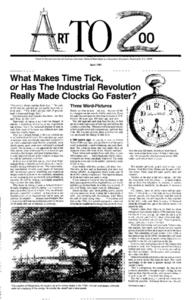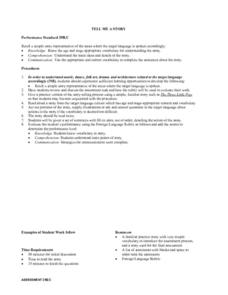Curated OER
What Makes Time Tick, or Has the Industrial Revolution Really Made Clocks Go Faster?
Students explore the concept of time both historically and in their own lives. Students count the number of times they refer to a clock and the number of scheduled and unscheduled activities in their lives. Students discuss how the...
Curated OER
Production of the Four Tones of the Chinese Language
Learners pronounce the four tones of the Chinese language. They play a red light-green light game in which they advance if they say words correctly.
Curated OER
Past Modals of Deduction-- Might Have, Could Have, Couldn't Have
In this language arts worksheet, students collaborate in pairs to read a situation and then complete two sentences using "might have, could have, can't have." The teacher does this at the same time as the students. Answers are then...
Curated OER
Tell Me A Foreign Language Story
Students practice retelling a simple story representative of the country where the target language is spoken: French, German, or Spanish. Given a worksheet with story details, students fill in missing details and rearrange details to...
Curated OER
Emotive language
Students examine emotion-based language. Students read a news story to discover examples of emotive words. They develop a class list of examples of emotive language. As a class project, students select a news story and change it into...
Curated OER
Language Arts: Creating Character Maps
Third graders select characters from books they have read to create character maps. After drawing the maps, they add the characteristics around a sketch of their chosen character. In groups, 3rd graders who have read the same book,...
Curated OER
Prompt and Answer: I Have, Who Has
In this grammar worksheet, 2nd graders respond to a given prompt and answer using the phrases I have and who has; this page contains 12 response cards.
Curated OER
The Language Of Crime Newspaper Reporting
In this language of crime reporting worksheet, middle schoolers read, write and discuss newspaper reports about crime, using fill ins, matching, and a crossword puzzle with notes for the teacher and an answer sheet.
Curated OER
Everybody Has a Story
Students read short stories and folk stories to explore oral history and story. They interview elderly family members and/or others in the community and record these stories and histories. They evaluate in a final essay what they have...
Curated OER
Language: lesson 23
In this language arts worksheet, students complete activities such as reading, writing high frequency words, finding long o words, fill in the blanks, and short answers. Students complete 4 activities.
Curated OER
Have to/ Had to
In this have to and had to worksheet, learners fill in the blanks with have to and had to, and match verbs to their meanings. Students complete 2 activities.
Curated OER
ESL Grammar: Have to/Don't Have to
In these English Language grammar worksheets, learners complete several exercises that help them learn to write the positive or negative form of 'have to.' Students write sentences use 'have to' or 'don't have to' depending on the...
Curated OER
I Have Some...
In this having items worksheet, students watch a video, write sentences, and answer short answer questions of items a person has. Students complete 3 activities total.
Curated OER
Auxiliaries- Be, Have, Do
In this auxiliaries worksheet, students write negative and question sentences using auxiliaries be, have, and do. Students complete 22 statements.
Curated OER
Circle the Word That Has the Same Ending Sound as in the Picture
In this letter and word recognition worksheet, students examine 6 words and determine the ending sound in the name for each. Students circle the words that have the same ending sound as the pictures.
Curated OER
Joltin' Joe Has Left and Gone Away
Students assess admirable qualities in entertainers. They discuss Joe DiMaggio's obituary, focusing on his accomplishments and place in American society. They research and create their own descriptive biographies of athletes and...
Curated OER
I Have - Who Has?
In this letter recognition worksheet set, students use the cards to participate in an "I Have - Who Has?" activity. They hold up a card that says, "I have ___., Who has ___?"
Curated OER
Test Yourself: Have Not Got and Has Not Got
In this writing answers practice instructional activity, students practice their grammar skills as they fill in the blank in 8 sentences with either have not got or has not got.
Curated OER
Have: What Pets Do They Have?
In this word recognition worksheet, students use 8 picture clues and phrases to write 8 sentence answers. Each sentence begins with he needs or she needs and ends with a pet name.
Curated OER
ASL: Lesson 20
Teach it, learn it, communicate with it. ASL is at your fingertips with this sign language series. Lesson 20 focuses on classifiers, descriptive vocabulary, and asking questions. Each blue link on the page takes you to an image or video...
Common Core Sheets
Declarative, Interrogative and Exclamatory Sentences
It's time to identify these sentences as interrogative, exclamatory, or declarative based on their ending punctuation.
Hawaiʻi State Department of Education
Dance in Hawai`i
Nearly every people group has some type of dance, and those dances usually reflect history and culture. Little researchers write an essay on the cultural significance of the Hawaiian hula dance. They research the role of the hula dancer...
National Endowment for the Humanities
A Defense of the Electoral College
Each presidential election year, the debate about the electoral college rages. Michael C. Maibach's "A Defense of the Electoral College" offers young political scientists an opportunity to examine a reasoned argument for why the...
Curated OER
CVC Puzzles
Words that use the consonant/vowel/consonant pattern are the focus of this language arts presentation. Students are shown a word that has the vowel missing and a picture representing the word. They have to choose one of the five vowels...























